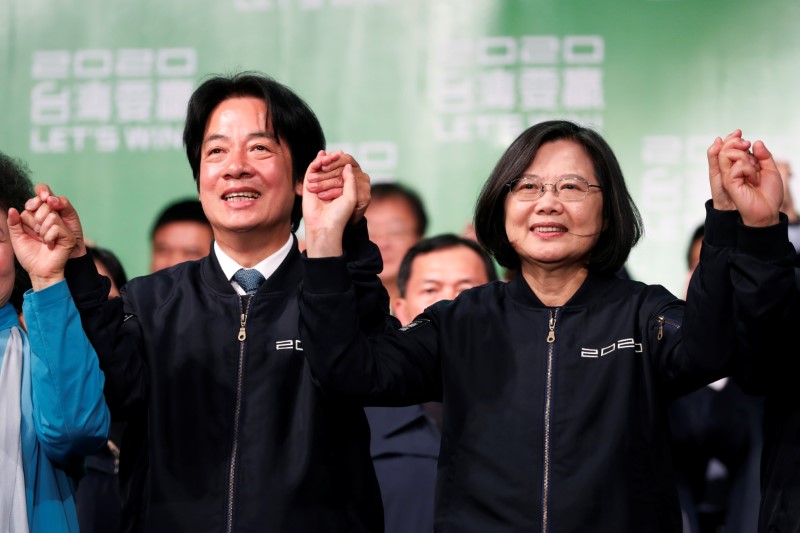By Ben Blanchard and Yimou Lee
TAIPEI (Reuters) - China will not change its position that Taiwan belongs to it, Beijing said on Sunday, after President Tsai Ing-wen won re-election and said she would not submit to China's threats, as state media warned she was courting disaster.
The election campaign was dominated by China's efforts to get the democratic island to accept Beijing's rule under a "one country, two systems" model, as well as by anti-government protests in Chinese-ruled Hong Kong.
"No matter what changes there are to the internal situation in Taiwan, the basic fact that there is only one China in the world and Taiwan is part of China will not change," China's Foreign Ministry said in a statement.
While China says Taiwan is its territory, Taiwan maintains it is an independent country called the Republic of China, its formal name.
Tsai, who has firmly rejected China's "one country, two systems" model, won another four-year term by a landslide on Saturday, and her Democratic Progressive (NYSE:PGR) Party (DPP) secured a majority in parliament.
"Taiwan's people once again use the vote in their hands to show the world the value of democracy," Tsai said on Sunday when meeting the head of the United States' de facto embassy in Taipei, Brent Christensen.
"Democracy and freedom are indeed Taiwan's most valuable asset and the foundation of the long-term Taiwan-U.S. partnership," Tsai said, vowing to deepen cooperation with the United States on issues from defense to economy.
On Saturday, Tsai called for talks to resume with China, but said she hoped Beijing understood Taiwan and its people would not submit to intimidation.
However, China will not change its stance on the "one China" principle and opposing Taiwan independence, the Chinese foreign ministry said.
"The universal consensus of the international community adhering to the 'one China' principle will not change either."
China hoped the world would support the "just cause" of Chinese people to oppose secessionist activities and "realize national reunification", it added.
Taiwan's Mainland Affairs Council said China should respect the election result and stop putting pressure on the island.
"Our government will firmly defend the sovereignty of the Republic of China and Taiwan's democracy and freedom," it said.
'POLICY TOOLBOX'
China's official Xinhua news agency said Tsai won by deploying dirty tricks, hyping the China threat and colluding with Western forces.
"Whether it is to curb Taiwan independence secessionist activities or to benefit Taiwan compatriots, the mainland has a full 'policy toolbox'," it said.
"Tsai and the DPP must be aware that they should not act wilfully because of a fluke."
U.S. Secretary of State Mike Pompeo congratulated Tsai and lauded her for seeking stability with China "in the face of unrelenting pressure".
Japan's Foreign Minister Toshimitsu Motegi also sent congratulations, referring to Taiwan as a "precious friend".
China's Taiwan Affairs Office said on Saturday it would continue promoting the "one country, two systems" model for Taiwan, which Beijing uses to run Hong Kong with a high degree of autonomy.
Many in the former British colony fear promises made under the system are not being kept.
On China's internet, there was unusual criticism for the Taiwan Affairs Office's failure to win over the island, especially as Tsai's win followed a landslide for pro-democracy candidates in Hong Kong's local elections in November.
"What have you been doing?" wrote one user on China's Twitter-like Weibo. "All the money you have spent and all you have done is give succor to hypocrites and traitors."
The criticism follows a denunciation of the Taiwan office on Friday by the Chinese Communist Party's anti-corruption watchdog for not following the party line enthusiastically and being too bureaucratic.
